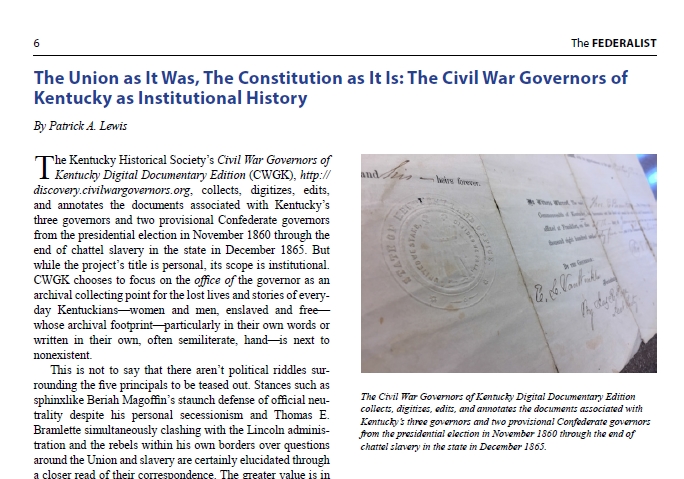What expectations did people have of local, state, and federal governments? Who were the faces of governance in their communities? How did they conceive of justice and equity? How did they understand the interaction of branches and levels of government, and how did they play governing institutions off of one another to secure the outcomes they desired?
In the Fall 2018 issue of The Federalist, the newsletter of the Society for History in the Federal Government, CWGK Project Director Patrick Lewis reflected on the important and relevant questions that the project has raised — both in the materials that it has found, published, and annotated and also in the process of managing a program within state government.

From using social networking to discover local power brokers operating outside the formal channels of power to appreciating the inability of antebellum institutions to cope with the overwhelming crisis that secession and Civil War brought to Kentucky society, CWGK provides a new research path forward for historians. How did people understand their government before the war and, when the conflict came to their doorstep, what expectations did they have for government intervention and assistance?
I have developed a profound empathy for both the plaintive citizens bringing horrifying tales of death, crime, sexual violence, destitution, and starvation as well as for the representatives of government at all levels who are chronically unable to muster sufficient resources to address the systemic problems they saw. It is easy to see the
Civil War as a crisis of elected government—at a legislative,
gubernatorial, Congressional, and especially Presidential level—but I have come to appreciate the war as it drug down an underprepared and underpowered civil service under the weight of modern, total war. The antebellum systems buckled underneath the crisis. That book is far more complicated to write than a conventional political history and far less marketable than a new battle history. That book about the slow collapse of governmental systems under unforeseen external stress might also b far more relevant to a moment when the national coffers have been drained by years of military conflict and faith in the capacity of electoral politics to address the day-to-day issues facing the citizenry is critically low.
Access a PDF of the full article here, or read the full issue at The Federalist.
